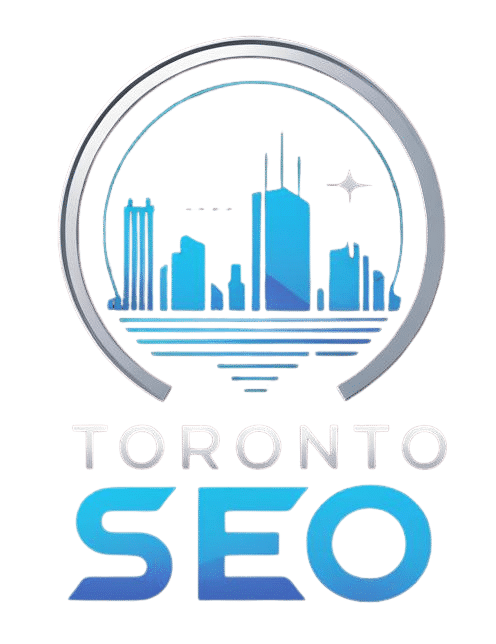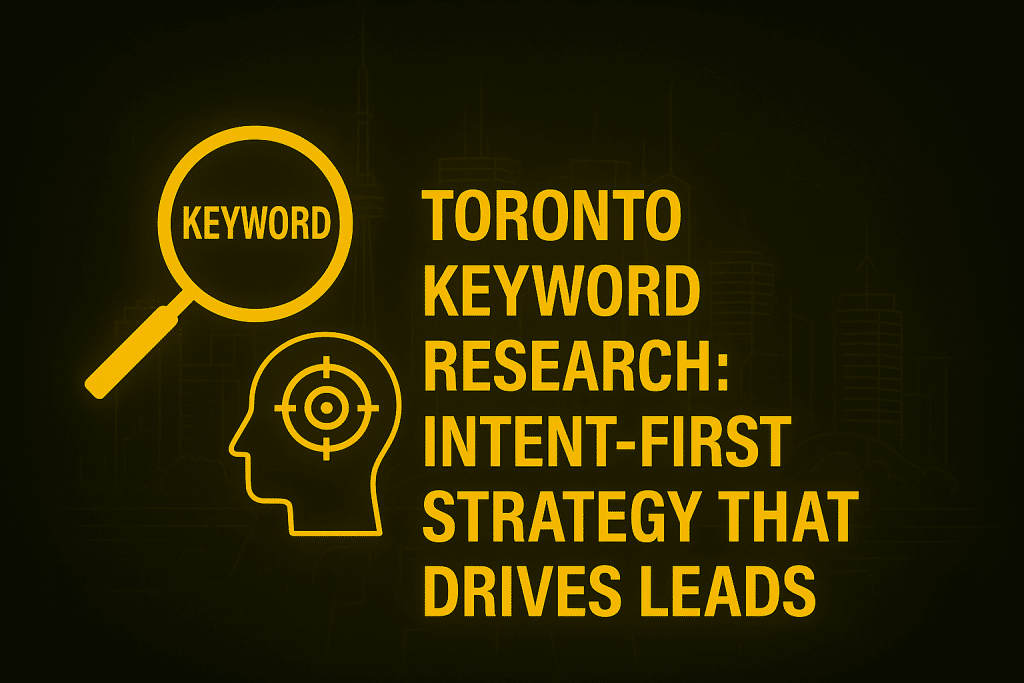Toronto Keyword Research: Intent-First Strategy That Drives Leads
In Toronto’s hyper-competitive digital market, keyword research is no longer just about identifying high-volume terms. Businesses that want to consistently generate qualified leads must adopt an intent-first approach to keyword strategy. By aligning search intent with content and user experience, Toronto brands can dominate local search rankings and convert organic traffic into real customers.
This guide dives deep into how intent-first keyword research works, why it’s crucial for Toronto businesses, and how to implement it for measurable growth.
Why Keyword Research Must Be Intent-First in Toronto
Keyword research in 2025 has evolved beyond pure volume metrics. Toronto’s diverse economy—from real estate to legal services, healthcare, and e-commerce—requires laser-focused targeting.
Search engines now prioritize user intent signals:
Informational intent: Users seeking answers, guides, or tutorials.
Navigational intent: Users looking for a specific brand, company, or location.
Transactional intent: Users ready to purchase or book a service.
Commercial investigation: Users comparing providers, costs, or features before buying.
Toronto businesses that fail to segment their keywords by intent often end up with irrelevant traffic that never converts into leads. By contrast, those who optimize for searcher psychology win clicks, rankings, and conversions.
Mapping Buyer Intent to the Toronto Customer Journey
The secret to effective keyword research lies in mapping keywords to the local buyer journey.
Stage 1: Awareness (Informational Keywords)
“What is SEO in Toronto?”
“Best digital marketing strategies for small businesses in Toronto”
At this stage, users aren’t ready to buy but need content-rich resources. A blog post explaining how to track SEO performance with analytics provides immense value.
Stage 2: Consideration (Commercial Investigation Keywords)
“Top SEO agencies in Toronto reviews”
“Toronto SEO expert vs in-house team”
Users here are comparing providers. A resource like Hiring a Toronto SEO Expert vs Doing It In-House directly answers their concerns.
Stage 3: Decision (Transactional Keywords)
“SEO company Toronto pricing”
“Local SEO agency near me Toronto”
These searches reflect buy-ready intent. Optimizing service pages around pricing, packages, and contact CTAs captures high-quality leads.
Building an Intent-Driven Keyword List for Toronto
To succeed, you need to classify every keyword into intent categories.
Step 1: Analyze SERPs for Toronto Queries
Google’s results reveal intent. If the top results are guides or blog posts, the keyword is informational. If ads, pricing pages, and agencies dominate, it’s transactional.
Step 2: Use AI Clustering and Local Data
Toronto agencies increasingly leverage AI-driven keyword clustering to group keywords by semantic intent. According to Toronto agencies leading in AI SEO, this tactic helps streamline optimization at scale.
Step 3: Prioritize Long-Tail, Local Keywords
Instead of generic terms like SEO services, Toronto businesses should aim for:
“SEO for real estate agents Toronto”
“Best immigration consultant SEO Toronto”
“Toronto e-commerce SEO mistakes to avoid”
These phrases attract highly qualified local traffic.

Why Search Intent Outranks Volume in Toronto SEO
Volume misleads. For instance, “SEO Toronto” has massive search volume but attracts broad users. A mid-volume term like “law firm SEO Toronto” will likely generate higher conversion rates.
The University of Toronto’s digital marketing insights highlight that intent-based targeting reduces bounce rates and increases lead conversions.
Content Optimization Aligned With Intent
Once you’ve segmented intent-driven keywords, align them with content types:
Informational intent → Blogs, guides, case studies
Example: Content optimization boosting engagementCommercial investigation → Comparison articles, pricing breakdowns
Example: SEO vs Google Ads in TorontoTransactional intent → Service pages, CTAs, landing pages
Example: Toronto SEO Pricing 2025
This strategic distribution ensures Google matches your pages to the correct intent category.
How to Turn Keyword Research Into Leads in Toronto
Keyword research is wasted unless it directly generates qualified leads. Here’s how Toronto businesses can maximize ROI:
1. Local SEO Optimization
Incorporate geo-intent terms like “near me” and “Toronto” into keywords. For service brands, implementing Google Business Profile Optimization is critical.
2. Leverage AI-SEO for Smarter Targeting
AI-powered SEO tools analyze searcher patterns and cluster intent automatically. Toronto companies embracing AI-SEO solutions are scaling faster than those relying on outdated manual processes.
3. Build Internal and External Linking Structures
Effective internal linking boosts topical authority. Adding contextual links to related resources builds a content ecosystem. For example:
Comparing SEO vs PPC in Toronto helps decision-stage leads.
Referencing AI SEO for Toronto startups adds future-focused context.
Complement these with external authoritative resources like Google Search Central to establish trust.
Common Keyword Research Mistakes Toronto Businesses Make
Focusing only on high-volume keywords without considering conversion potential.
Ignoring intent signals and producing irrelevant content.
Neglecting long-tail opportunities that capture niche markets.
Underestimating AI-driven clustering that Toronto competitors are already leveraging.
Failing to monitor results and adjust strategy when search behavior shifts.
Measuring Success of Intent-First Keyword Strategy
The right keyword research strategy must be tied to measurable KPIs:
Organic lead growth
Conversion rates from transactional queries
Bounce rates on informational pages
Local map pack rankings
ROI compared to paid campaigns
Toronto agencies emphasize 90-day performance tracking with analytics dashboards, ensuring businesses adjust strategy in real time.
Future of Intent-First Keyword Research in Toronto
With Google’s AI-driven search experience (SGE) shaping results, the future of keyword research is intent alignment plus entity authority. Toronto businesses that combine semantic clustering, AI-driven insights, and local optimization will not only rank higher but own their niche categories.
The landscape will only get more competitive. Brands that adapt now will secure the strongest positions in Toronto’s digital marketplace.
Conclusion: Convert Search Intent Into Business Growth
Keyword research is no longer about chasing search volume—it’s about understanding intent. By structuring your SEO campaigns around how Toronto users search, compare, and purchase, you move from traffic generation to lead generation.
The businesses that succeed in Toronto’s search ecosystem are those that combine intent-driven keyword strategy, AI-enhanced optimization, and local authority-building.
To start aligning your keyword research with intent and growing qualified leads, explore our Contact Page and let’s build a strategy that dominates Toronto’s SERPs.


